I captioned half of a11ycampNYC a few weekends ago, switching off with the illustrious Stan Sakai. I also gave two presentations, one five-minute lunchtime demo that I captioned myself, and one full-length presentation that Stan captioned. Eventually I want to upload this with fully edited, properly timed captions using Amara, but I thought I'd post the provisional versions for now, just so they're out there. If you'd like to see the other presentations that day, all with recorded (unedited) live captions, check out The Internet Society's recording archive.
Here's my five-minute steno demo:
And here's my talk, The Three Prongs of Steno Accessibility:
Stenographic technology has been used to provide realtime captioning for over 25 years, but two other important potential applications of steno for accessibility are less well known: 1) As a way to rectify the catastrophic levels of underemployment in the blind/low vision community (especially those who use screen readers and are already comfortable processing speech at over 300 WPM) by making it possible for them to become professional realtime captioners, and 2) By integrating it with text-to-speech technology to allow for a truly conversational speech synthesis system for AAC users. In this session, I'll discuss these three potential applications and the way they intersect.
Many thanks to Stan for captioning me and to Thomas, Shawn, and Cameron, the organizers of a11ycampnyc and of the ongoing a11ynyc Meetup group! It was a fantastic experience.
Thursday, October 8, 2015
Thursday, August 27, 2015
Help Crowdfund Captioning And Interpreting for Polyglot NYC!
Polyglot Conference NYC 2015 is looking for funding so that they can pay for captioning of two simultaneous tracks plus full interpreting teams for deaf attendees. Ellen Jovin, the organizer of the conference, writes:
Polyglot Conference NYC 2015 will bring hundreds of polyglots and language enthusiasts from around the world to New York this October for two days of wide-ranging language talks. Speakers include the inventor of the language Dothraki for the HBO hit Game of Thrones, multiple polyglots who speak 6+ languages, New York’s own celebrity teen polyglot Tim Doner, linguist-writer John McWhorter, representatives of major language-learning publishers, and many others. We will have exhibitors, book-signings, goodie bags for participants, and the sharing of absolute mountains of inspiring and useful information.Please spread the word as far and wide as you can, and know that if you chip in a few dollars, you'll be able to see all the captioned conference videos online afterwards! I'd really love to be able to be one of the captioners at this conference. It looks absolutely amazing.
As part of our event, we are crowdfunding to pay for interpreter and live captioning services. The plan is to record the conference talks, then convert the live captioning later so that it can be used on videos available online to the deaf and hard of hearing, as well as polyglots and language enthusiasts around the world who do not speak English natively and might appreciate having a written transcript to supplement the audio/video. People who will benefit include many enthusiasts who wish to attend the New York conference but can’t afford it, or who have disabilities making travel impossible or difficult, or who are unable to obtain visas. If you know anyone who would be willing to contribute, we would be most grateful, as we want to spread information globally about the joys and value of language-learning to as many people as we can. Richard Simcott, who appears in the video, is a co-organizer and speaks 16+ languages. He is unbelievably gifted and a real leader in the polyglot community.
Thursday, August 13, 2015
2015 NCRA Convention Wrap-Up
It's already been a little while, but I just wanted to blog about the NCRA convention while it was still somewhat fresh in my memory!
It all started on Thursday. I got there early, set up the Open Steno Project table, and then headed over to the Realtime Contest. I'd never competed before, and I knew that test nerves were definitely going to be a problem, but I wanted to give it a shot. Since I've never taken testimony in my life, I didn't care much about the Q&A (and, predictably, I bombed it), but I managed to struggle through a halfway decent Lit that sounded smooth and almost ponderous to my ears, but was thwarted by my thumping heart and jittery fingers. Later I found that I came in at 11th place, which was good enough that I wasn't totally disappointed in myself, but not quite good enough to be satisfied. Next time, whenever that may be, I'm gonna aim for top five.
After the test, I met up with some of my long-time steno Twitter buddies for a food crawl. From right to left: nerd_for_words, @mscourtreporter, her husband @chefie_b, his cousin (dunno if she has a Twitter), me, and StenYes, plus two photobombers in the back. Not pictured: The charming but elusive depo reporter @chr1st0p43r.
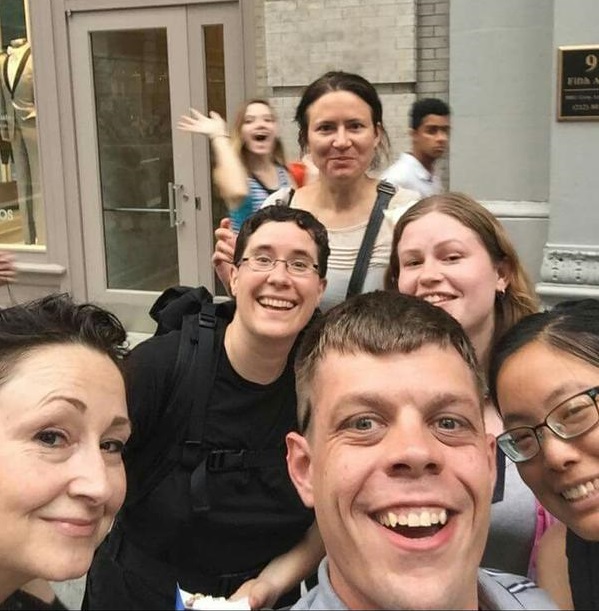
We had everything from banh mi to roasted okra to bubble tea to vegan sushi to waffles to black sesame milkshakes to deep-fried shrimpy radish cubes, and it was all AMAZING.
Grinning and replete, I rolled home and into bed to prepare for the next day.
Friday morning, I got to speak a bit about the Open Steno Project at the opening session (here's me being an excitable dork about steno, with Dom Tursi looking less than impressed):
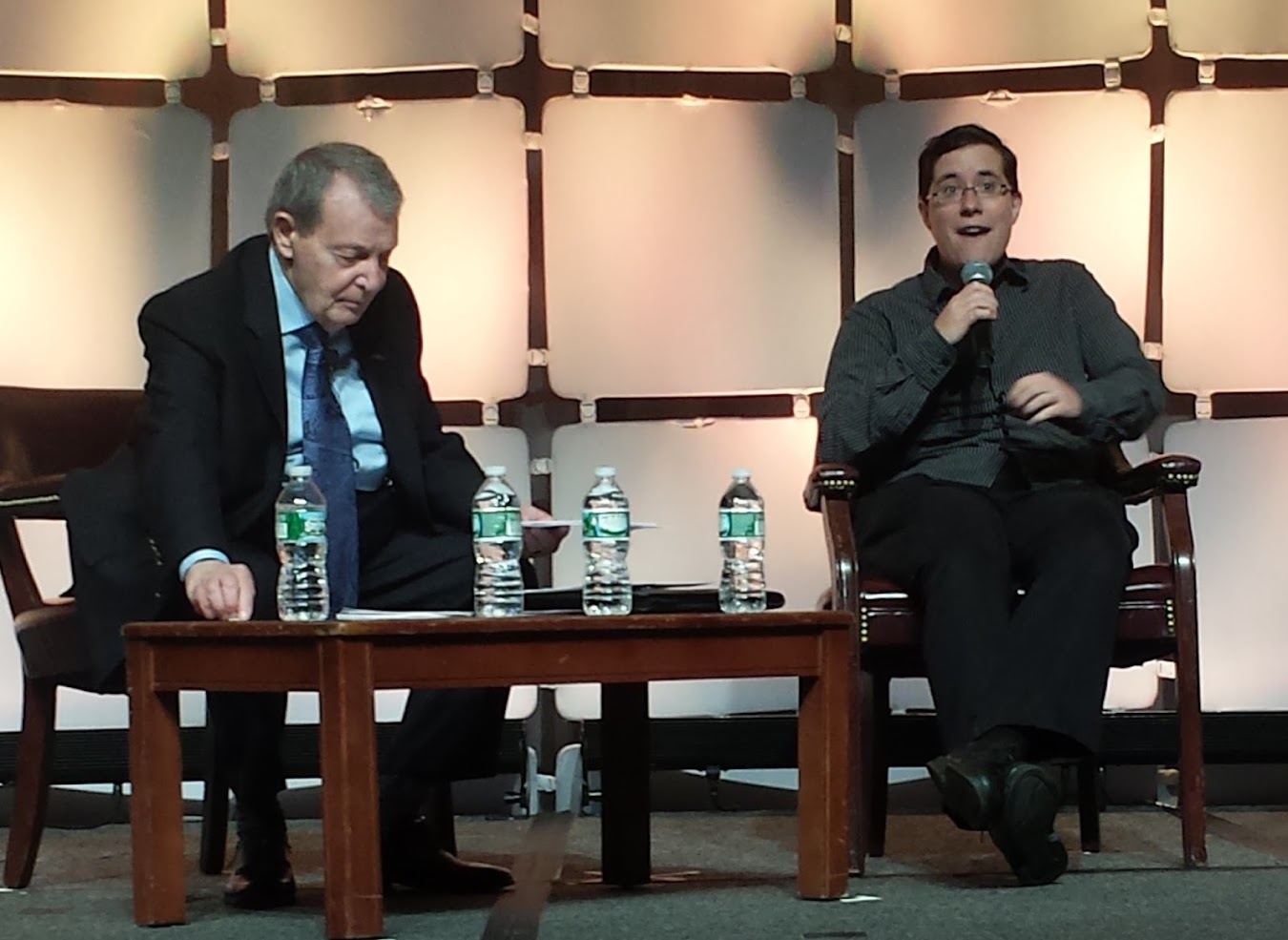
And then spent the rest of the day manning the Open Steno Project table with Josh Lifton, Plover's first programmer and inventor of the Stenosaurus, which should hopefully be coming out in the next few months! Stan helped out too, which was awesome, since he's Plover's first and most illustrious success story. He started on Plover way back in 2010, then wound up teaching himself steno and becoming a Certified CART Provider without ever setting foot in a steno school.
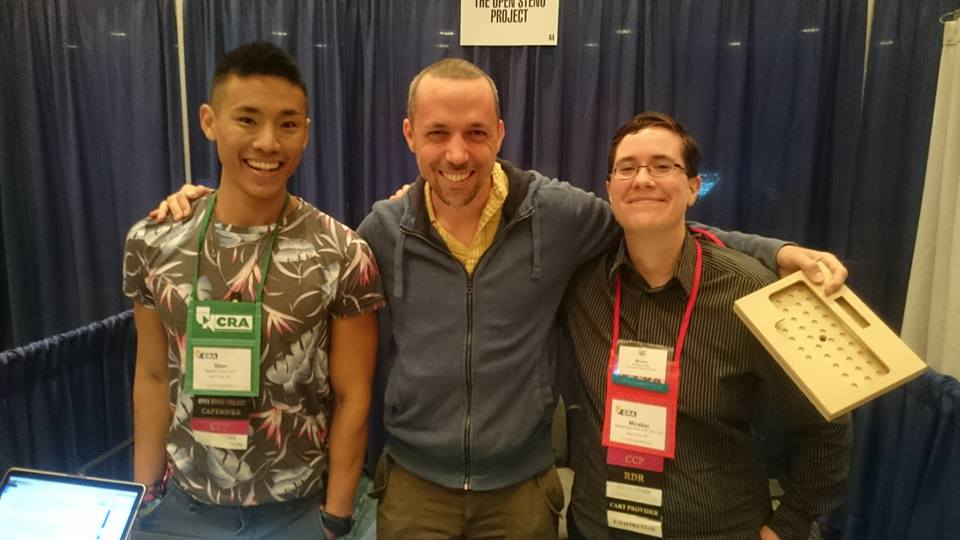
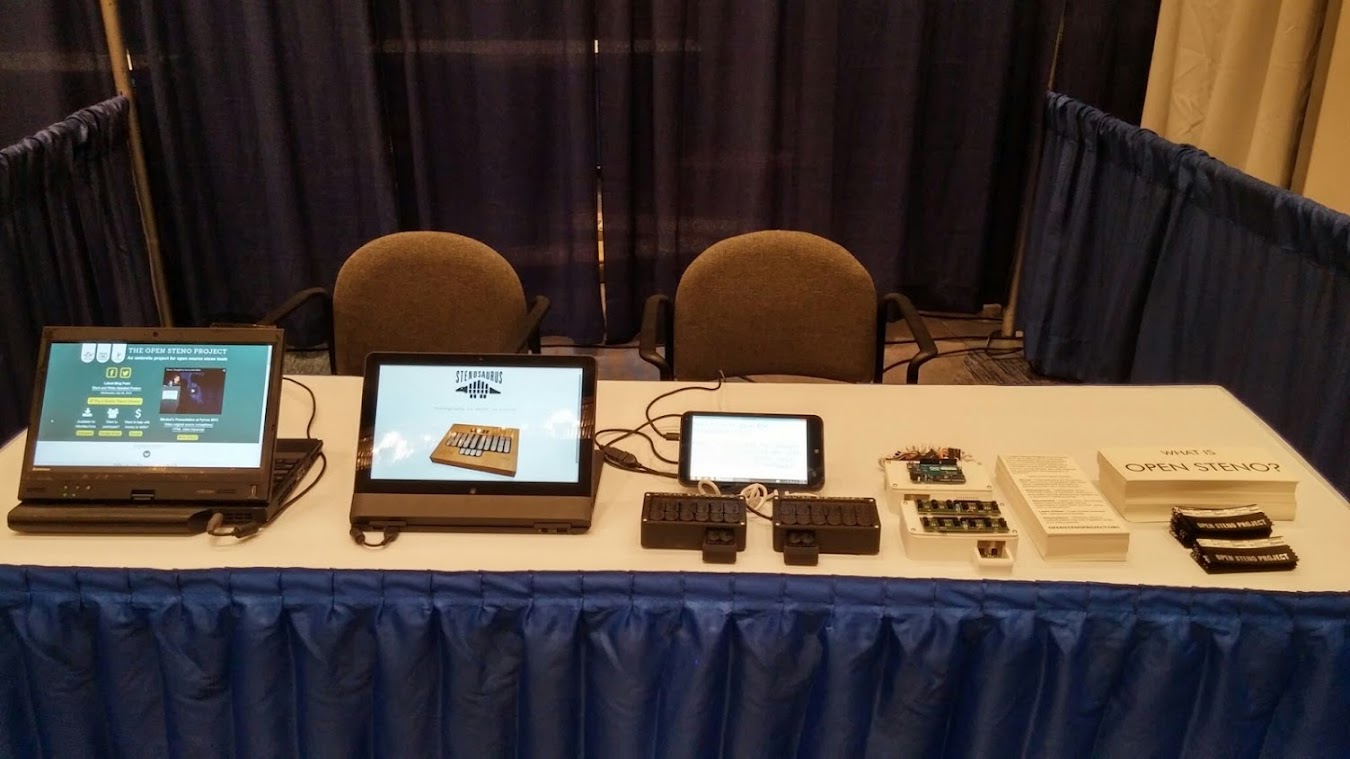
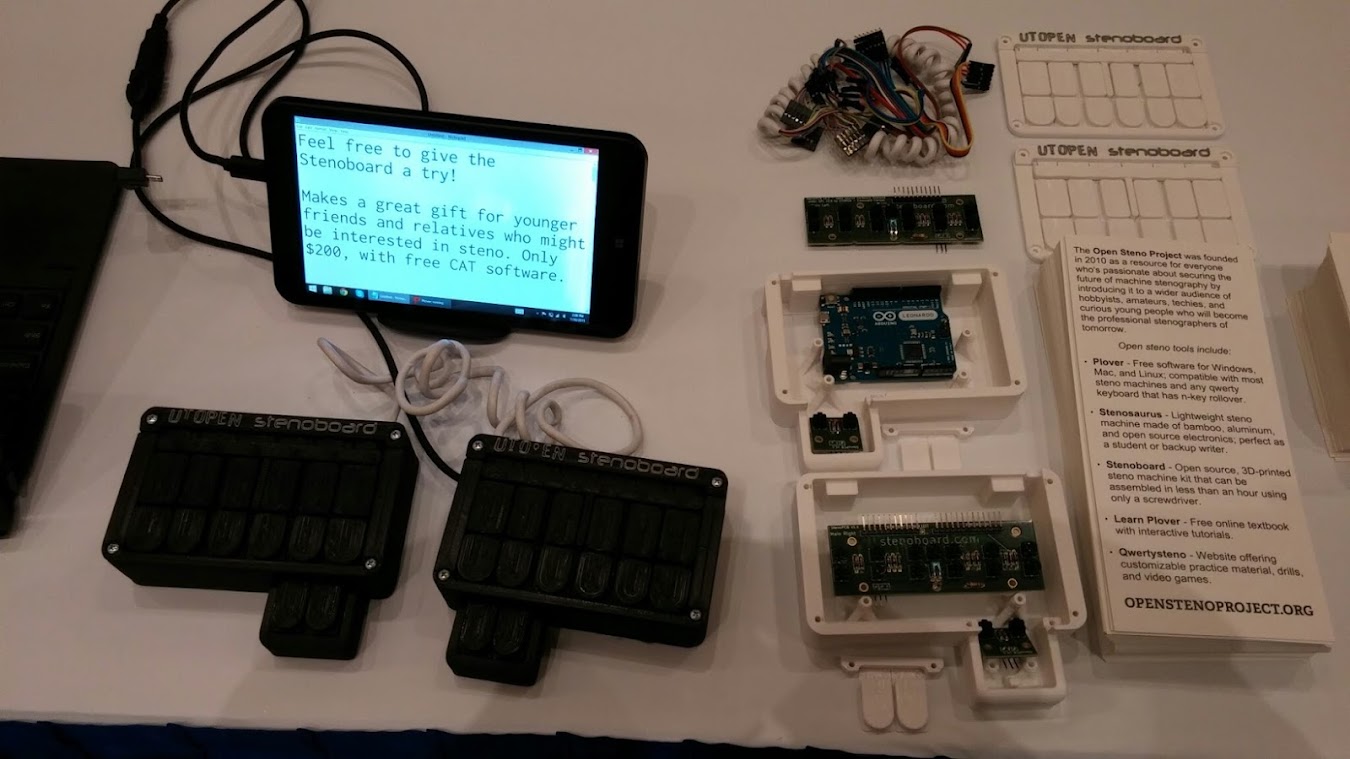
We got a lot of great questions about Open Steno, and several people signed up for the Stenosaurus mailing list or said that they were gonna buy a Stenoboard kit for a younger relative who might be interested in steno, which made me really happy.
Then the White Coat Captioning team (Stan and me plus our fearless leader Norma Miller) assembled for one of our rare but always delightful in-person meetups. We had delicious Indian food for lunch, and got to indulge in our favorite pastime: Talking shop.
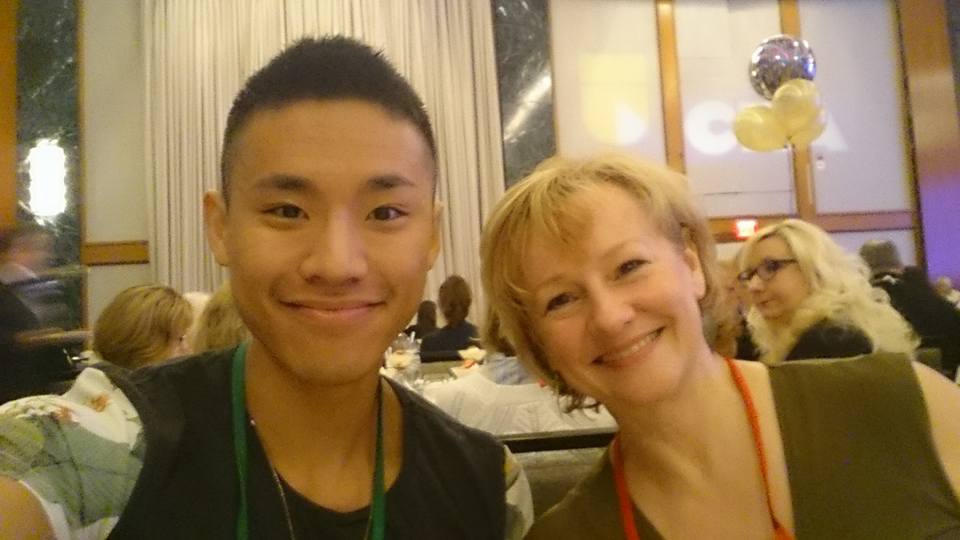
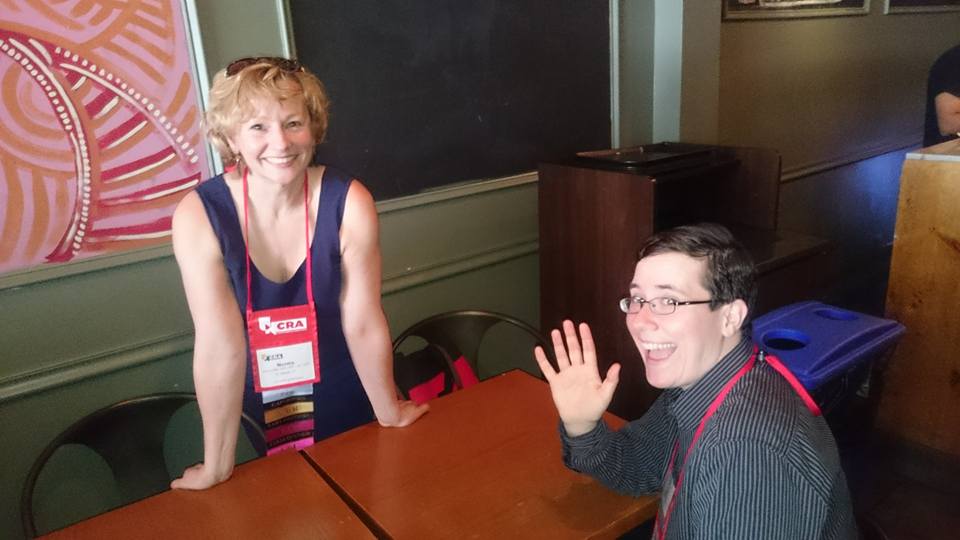
That night we went to the CART/Captioning Reception, and then straight on to the screening of For the Record, which Stan starred in alongside other steno luminaries. At the end they all got up on stage and answered questions, and it was a heck of a good time.
I hadn't managed to go to any sessions on Friday because I'd been so occupied with the Open Steno Project table, but I was kicking myself after Norma told me how amazing she'd found the seminar on Creative and Critical Captioning. I mean, just look at this description:
I also got to help out with the Tech Connection session, talking up the TextOnTop system, which now offers automated multilanguage translation and (even more exciting in my book) a micro-USB dongle that works in small tablets such as the HP Stream 7.
Finally it was time for my own session, Advanced Topics in CART. I was pretty worn out by then, but that was okay, because it was much more of a collaborative discussion than a presentation per se. We voted on which subjects were most interesting to the assembled crowd, and came up with the following four areas, which more than filled up the time:
* Proactive conference captioning: How to get conferences to offer captioning without a specific request from a deaf or hard of hearing attendee. We talked over various options, such as putting together compilations of positive feedback for captioning from previous conferences and transmitting them via Storify, asking organizers to conduct audience surveys and write blog posts after each conference, retweeting pro-captioning comments from the conference hashtag while the conference is going on, allowing attendees to get a crash course in steno by playing on our steno machines during breaks, and someone even brought up the possibility of contacting venues such as hotels and convention centers rather than conference organizers themselves, with the thought that if they had a standing resource for captioning, they might be able to reach an even broader sector of conferences. Very promising stuff.
* One-stroke googling: How to configure various types of steno software to make a single touch of a foot pedal or a particular steno stroke search for a highlighted word or name via Google on a secondary monitor. It doesn't seem like any software has this technique completely hammered down yet (Plover can sort of do it, though it's a little cumbersome), but there's high demand for it among remote captioners. Hopefully it'll be readily available across platforms in the near future.
* Dealing with dodgy WiFi: Ways to deal with a dicey WiFi connection, from trying to boost it using systems such as Speedify, trying to work with it by using bandwith-limiting caption systems that used text streaming rather than high-bandwidth screen sharing apps, or circumventing the need for WiFi altogether, when possible, by using cell phone audio, TextOnTop, wireless LANs, or Bluetooth.
* Remote caption audio troubleshooting. I asked the crowd what one element turned their daily audio from a screechy, staticky nightmare into an actual decent job. They had all sorts of answers, including buying a mixer board, pushing for the university to update the video streaming software they use for online courses, using teleconference meeting rooms with "octopus mics", and using the integrated two-mic system offered by OneInterpreting. Unfortunately I forgot to mention my own lifesaving solution for jobs involving a sound board: Making sure the computer running Skype is plugged into a USB audio coupler.
That discussion led into an even more interesting one, about the dangers of hearing loss for both onsite and remote providers. We talked about which jobs we decided to turn down for the sake of our hearing health, a few providers talked about how getting hearing aids helped them to continue the work they loved without any drop in quality, and many of us admitted that the fear that prevented us from getting baseline hearing tests was both counterproductive and potentially career-ending. It was so incredible to be in a room with dozens of my colleagues, all of us with years of experience and vast amounts of passion and knowledge for captioning, sharing tips and commiserating and getting excited about making our jobs even better. It was a magical experience, and I can't express how grateful I am to have been able to be a part of it.
After that, I had to go pack up the Open Steno Table, and by then I was too exhausted to even think about going to the dance that evening. I came home and went to bed with the best of intentions, but didn't manage to wake up in time to go to either of the Sunday morning sessions. It was a marvelous handful of days -- intense, challenging, and fun as all get out. Introvert that I am, I was completely thrilled to be able to shmooze with some of the best stenographers in the country, and to hear all their mindblowing stories. I'm not sure if I'll be able to get out to next year's convention, but I'm so, so glad I got the chance to experience this one in my own home city.
It all started on Thursday. I got there early, set up the Open Steno Project table, and then headed over to the Realtime Contest. I'd never competed before, and I knew that test nerves were definitely going to be a problem, but I wanted to give it a shot. Since I've never taken testimony in my life, I didn't care much about the Q&A (and, predictably, I bombed it), but I managed to struggle through a halfway decent Lit that sounded smooth and almost ponderous to my ears, but was thwarted by my thumping heart and jittery fingers. Later I found that I came in at 11th place, which was good enough that I wasn't totally disappointed in myself, but not quite good enough to be satisfied. Next time, whenever that may be, I'm gonna aim for top five.
After the test, I met up with some of my long-time steno Twitter buddies for a food crawl. From right to left: nerd_for_words, @mscourtreporter, her husband @chefie_b, his cousin (dunno if she has a Twitter), me, and StenYes, plus two photobombers in the back. Not pictured: The charming but elusive depo reporter @chr1st0p43r.

We had everything from banh mi to roasted okra to bubble tea to vegan sushi to waffles to black sesame milkshakes to deep-fried shrimpy radish cubes, and it was all AMAZING.
Grinning and replete, I rolled home and into bed to prepare for the next day.
Friday morning, I got to speak a bit about the Open Steno Project at the opening session (here's me being an excitable dork about steno, with Dom Tursi looking less than impressed):

And then spent the rest of the day manning the Open Steno Project table with Josh Lifton, Plover's first programmer and inventor of the Stenosaurus, which should hopefully be coming out in the next few months! Stan helped out too, which was awesome, since he's Plover's first and most illustrious success story. He started on Plover way back in 2010, then wound up teaching himself steno and becoming a Certified CART Provider without ever setting foot in a steno school.



We got a lot of great questions about Open Steno, and several people signed up for the Stenosaurus mailing list or said that they were gonna buy a Stenoboard kit for a younger relative who might be interested in steno, which made me really happy.
Then the White Coat Captioning team (Stan and me plus our fearless leader Norma Miller) assembled for one of our rare but always delightful in-person meetups. We had delicious Indian food for lunch, and got to indulge in our favorite pastime: Talking shop.


That night we went to the CART/Captioning Reception, and then straight on to the screening of For the Record, which Stan starred in alongside other steno luminaries. At the end they all got up on stage and answered questions, and it was a heck of a good time.
I hadn't managed to go to any sessions on Friday because I'd been so occupied with the Open Steno Project table, but I was kicking myself after Norma told me how amazing she'd found the seminar on Creative and Critical Captioning. I mean, just look at this description:
Composing Sound – A Workshop on Creative and Critical Captioning – Ever wonder what sparks of imagination come from the next generation of caption users and captioner creators? In this workshop, we will explore a number of creative and critical exercises for discussion about — and then the creation of — captioning as another way of thinking about writing. Immersed in digital media, social media, and multimodal texts at all times, college-age students are a part of the next generation of caption-readers and caption-makers (aka, CART-writers). Led by a university professor of college writing courses who is deaf (a CART-user herself), in this workshop we will roll up our CART sleeves and think about the creative and critical potential of captioning for the present and the future.I was crushed to have missed it, but fortunately Brenda Brueggemann, the deaf professor who led it, did another session on Saturday which I was able to attend: Making an Elevator Speech for Broadcast Captioners/CART Captioners. It was a heck of a lively session, with lots of spirited back and forth, but eventually this is what my group managed to come up with:
Public event captioning benefits everyone, including people with hearing loss, non-native English speakers, people who want to take notes, and people who find that multimodal access helps them to comprehend dense and difficult material.Professor Brueggemann conducted the session with expert aplomb, and I'd be thrilled if she would consent to come back sometime. In fact, several captioners and I have decided that we're going to petition the NCRA to make an official policy that each convention going forward will have at least one deaf or hard of hearing speaker. They're the people who can best direct us on how we should do our jobs, and their perspectives are absolutely invaluable.
I also got to help out with the Tech Connection session, talking up the TextOnTop system, which now offers automated multilanguage translation and (even more exciting in my book) a micro-USB dongle that works in small tablets such as the HP Stream 7.
Finally it was time for my own session, Advanced Topics in CART. I was pretty worn out by then, but that was okay, because it was much more of a collaborative discussion than a presentation per se. We voted on which subjects were most interesting to the assembled crowd, and came up with the following four areas, which more than filled up the time:
* Proactive conference captioning: How to get conferences to offer captioning without a specific request from a deaf or hard of hearing attendee. We talked over various options, such as putting together compilations of positive feedback for captioning from previous conferences and transmitting them via Storify, asking organizers to conduct audience surveys and write blog posts after each conference, retweeting pro-captioning comments from the conference hashtag while the conference is going on, allowing attendees to get a crash course in steno by playing on our steno machines during breaks, and someone even brought up the possibility of contacting venues such as hotels and convention centers rather than conference organizers themselves, with the thought that if they had a standing resource for captioning, they might be able to reach an even broader sector of conferences. Very promising stuff.
* One-stroke googling: How to configure various types of steno software to make a single touch of a foot pedal or a particular steno stroke search for a highlighted word or name via Google on a secondary monitor. It doesn't seem like any software has this technique completely hammered down yet (Plover can sort of do it, though it's a little cumbersome), but there's high demand for it among remote captioners. Hopefully it'll be readily available across platforms in the near future.
* Dealing with dodgy WiFi: Ways to deal with a dicey WiFi connection, from trying to boost it using systems such as Speedify, trying to work with it by using bandwith-limiting caption systems that used text streaming rather than high-bandwidth screen sharing apps, or circumventing the need for WiFi altogether, when possible, by using cell phone audio, TextOnTop, wireless LANs, or Bluetooth.
* Remote caption audio troubleshooting. I asked the crowd what one element turned their daily audio from a screechy, staticky nightmare into an actual decent job. They had all sorts of answers, including buying a mixer board, pushing for the university to update the video streaming software they use for online courses, using teleconference meeting rooms with "octopus mics", and using the integrated two-mic system offered by OneInterpreting. Unfortunately I forgot to mention my own lifesaving solution for jobs involving a sound board: Making sure the computer running Skype is plugged into a USB audio coupler.
That discussion led into an even more interesting one, about the dangers of hearing loss for both onsite and remote providers. We talked about which jobs we decided to turn down for the sake of our hearing health, a few providers talked about how getting hearing aids helped them to continue the work they loved without any drop in quality, and many of us admitted that the fear that prevented us from getting baseline hearing tests was both counterproductive and potentially career-ending. It was so incredible to be in a room with dozens of my colleagues, all of us with years of experience and vast amounts of passion and knowledge for captioning, sharing tips and commiserating and getting excited about making our jobs even better. It was a magical experience, and I can't express how grateful I am to have been able to be a part of it.
After that, I had to go pack up the Open Steno Table, and by then I was too exhausted to even think about going to the dance that evening. I came home and went to bed with the best of intentions, but didn't manage to wake up in time to go to either of the Sunday morning sessions. It was a marvelous handful of days -- intense, challenging, and fun as all get out. Introvert that I am, I was completely thrilled to be able to shmooze with some of the best stenographers in the country, and to hear all their mindblowing stories. I'm not sure if I'll be able to get out to next year's convention, but I'm so, so glad I got the chance to experience this one in my own home city.
Wednesday, July 1, 2015
Advanced Topics in CART at the 2015 NCRA Convention
Way back in 2006, I was just starting my second year of steno school when the NCRA convention came to New York City. I got myself a student membership and had a fantastic time. Over that weekend I schmoozed at the Friday night CART/Captioning reception, attended a number of interesting seminars (including the one where I learned the OEU diphthong trick as an all-purpose wildcard for briefs, which has proven absolutely invaluable over the years), had lunch with the legendary Ed Varallo, and got a small but tantalizing taste of what my future professional life might look like. I've often joked that being a realtime captioner among court reporters is like being a tailor among barbers; they both use scissors and we both use steno machines, but we all do substantially different jobs. While many seminars at NCRA conventions focus on things like transcript preparation, negotiating with law firms, advocating for official reporters in the courtroom, and other legal-heavy subjects, there tends to be a dearth of captioner-specific material. I went to the national convention in Nashville in 2013 and to TechCon in Atlanta last year, but each time most of the seminars related to CART and captioning were focused on basic 101-level "how do I stream text to clients", or "how can I switch from depo reporting to captioning" sorts of subjects.
Early this spring, I put in two proposals to speak at the 2015 NCRA convention, which will be coming back around to my own home town. The first was an introduction to The Open Steno Project, talking about our ethos, our current offerings, and our plans for the future. The NCRA didn't go for that one, so I decided to register the OSP as an exhibitor in the expo hall. Josh Lifton, my original cofounder and inventor of the Stenosaurus, will be there helping to man the table, and we're hoping we might get a sneak preview of a working Stenosaurus to show off to interested visitors. Today I ordered Open Steno Project badge ribbons and brochures, and I'm really excited to start getting the word out.
My other proposed session was accepted! It's called Advanced Topics in CART (Saturday from 4:00 to 5:30 on the Realtime Track), and I see it primarily as a roundtable discussion on everything that reaches beyond the elementary topics discussed at length in previous years. Everyone is welcome to sit in -- students, aspiring captioners, new professionals, and anyone else who's interested -- but I'd mostly like to hear from experienced captioners and CART providers who want to exchange ideas, ask questions, and solve problems collaboratively among their colleagues.
Over the next few weeks, I'm hoping compile a list of topics to kick off the session. For example:
* How to behave when hired to caption a conference proactively and not for the sake of any particular deaf or hard of hearing attendee. Is it appropriate to make jokes in the captioning stream when presenters try to interact with you? Should you advocate for the benefits of proactive captioning while on the clock?
* How to balance a mixed roster of onsite and remote work, or of work obtained through agencies versus directly contracted with clients.
* Steno students and captioning interns: Are they welcome in classrooms and workplaces of deaf/HoH clients?
* How to describe the differences between CART and non-verbatim methods such as Typewell and C-Print in a respectful and accurate way to potential clients.
* Changing trends in the field and what we can look forward to in the future.
So those are some items off the top of my head. Can you think of any more? I'd like to get a fair number of them, so I can have a few to choose from on the day of the roundtable. Please share this post with any CART Providers and captioners you might know; I'd love to hear from all of them.
Oh, and if you attend the CART/Captioning reception on Friday night, please come up and say hi! I'm really, really excited to have such a huge concentration of awesome steno people in my city this month. It's gonna be a blast.
Early this spring, I put in two proposals to speak at the 2015 NCRA convention, which will be coming back around to my own home town. The first was an introduction to The Open Steno Project, talking about our ethos, our current offerings, and our plans for the future. The NCRA didn't go for that one, so I decided to register the OSP as an exhibitor in the expo hall. Josh Lifton, my original cofounder and inventor of the Stenosaurus, will be there helping to man the table, and we're hoping we might get a sneak preview of a working Stenosaurus to show off to interested visitors. Today I ordered Open Steno Project badge ribbons and brochures, and I'm really excited to start getting the word out.
My other proposed session was accepted! It's called Advanced Topics in CART (Saturday from 4:00 to 5:30 on the Realtime Track), and I see it primarily as a roundtable discussion on everything that reaches beyond the elementary topics discussed at length in previous years. Everyone is welcome to sit in -- students, aspiring captioners, new professionals, and anyone else who's interested -- but I'd mostly like to hear from experienced captioners and CART providers who want to exchange ideas, ask questions, and solve problems collaboratively among their colleagues.
Over the next few weeks, I'm hoping compile a list of topics to kick off the session. For example:
* How to behave when hired to caption a conference proactively and not for the sake of any particular deaf or hard of hearing attendee. Is it appropriate to make jokes in the captioning stream when presenters try to interact with you? Should you advocate for the benefits of proactive captioning while on the clock?
* How to balance a mixed roster of onsite and remote work, or of work obtained through agencies versus directly contracted with clients.
* Steno students and captioning interns: Are they welcome in classrooms and workplaces of deaf/HoH clients?
* How to describe the differences between CART and non-verbatim methods such as Typewell and C-Print in a respectful and accurate way to potential clients.
* Changing trends in the field and what we can look forward to in the future.
So those are some items off the top of my head. Can you think of any more? I'd like to get a fair number of them, so I can have a few to choose from on the day of the roundtable. Please share this post with any CART Providers and captioners you might know; I'd love to hear from all of them.
Oh, and if you attend the CART/Captioning reception on Friday night, please come up and say hi! I'm really, really excited to have such a huge concentration of awesome steno people in my city this month. It's gonna be a blast.
Thursday, June 11, 2015
Hearing Loss Scam Spam
Yesterday, a multimonth experiment came to an end. I just couldn't take it anymore. See, ages ago I realized that certain vital work emails were being sent to my spam folder in gmail, no matter how many times I marked them "not spam" or "priority". Non-fishy, obviously legitimate things like the PEPNET or DSSHE mailing lists. More than once, it was an invoice or a job offer. I know that most of the time when someone gets an email from "The United Nations", it's part of a 419 scam, but sometimes the actual United Nations requires actual captioning services, y'know?!
After I'd discovered far too many important emails trapped in spam, I had to make a decision: Either I had to manually go through my spam folder every day -- which would be almost impossible -- or I had to establish a series of whitelist filters, where everything containing a specified word would go directly to my inbox, even if Gmail thought it was spam. The words I selected were:
steno
cart
invoice
transcription
transcribe
caption
captioning
stenography
disability
disabled
deaf
and...
hearing
The first 11 keywords have served me well. A lot of important stuff that would have gone into spam has been caught by those words and brought to my attention. That last one, though... That was the problem.
Regain Hearing Loss - Reverse Hearing Loss In Days in less than 3 weeks?
Why Amish Have Such Great Hearing
Proven 200yr Old Method To Reverse Your Hearing
Jailed For Finding Hearing Loss Remedy

And on and on and on, in infinite variations, hundreds of spam messages a day. Now, I've got a pretty efficient email sorting method. I strive to get to Inbox Zero as often as possible. When I wake up, I plow through everything at once, sorting messages into @reply and @action. Everything else either gets archived or trashed. Only after I've gotten to Inbox Zero do I start tackling the @reply box. But even with a pretty disciplined sorting method, deleting hundreds of hearing-related spam messages every day was getting really, really tedious.
I kept the keyword whitelisted for a long time, though, partly because I was worried about missing an important work-related email... But also partly because I felt weirdly bad about the whole phenomenon. Like I should be paying witness to the ways in which people with hearing loss are preyed upon, the ways in which spammers try to exploit and manipulate them. I tried to think to myself, as I was deleting this drek every day, "What if I'd just lost my hearing, and this landed in my inbox? Would I be tempted to click on it? How are these spammers making their money? Who falls into these traps, and what kind of snake oil is eventually sold to them? Is it actively harmful, or just expensive and ineffective? Are these sorts of messages tested for how well they target desperate people? Which ones work best? And what's their obsession with the Amish?!"
For a long time, I tried to use my thrice-daily spam-blasting time as a way to build empathy for the people I know who have had to deal with both the annoyances and frustrations of late-onset hearing loss and the neverending aggravations of both well-meaning and not-so-well-meaning people who insist that there must be an easy cure just around the corner, if only they'd keep looking for it. There must be a pill you can take, a device you can buy, an exercise method you can do, that's better than any hearing aid, that can make you good as new again, that can take care of all your problems. I'd think of the constant struggles my clients have to go through to get captioning arranged and paid for, to remind coworkers not to cover their mouths when they speak to them, to cope with the fatigue of lipreading for days on end, while all the time these shady companies are trying to stick their knife in wherever they can, constantly probing for a moment of credulity or weakness, all in the hopes of making money.
Spammers? Are freaking evil.
Finally, I realized I couldn't handle it anymore. I wasn't learning anything new about the attempted exploitation of late deafened and hard of hearing people. I was just getting angry and fed up with weeding out hundreds of lying messages every day. I took the keyword off my whitelist and resigned myself to missing any work emails that included "hearing" but not "captioning", "steno", or "deaf".
Today I woke up to a strangely quiet inbox and a feeling of intense relief.
After I'd discovered far too many important emails trapped in spam, I had to make a decision: Either I had to manually go through my spam folder every day -- which would be almost impossible -- or I had to establish a series of whitelist filters, where everything containing a specified word would go directly to my inbox, even if Gmail thought it was spam. The words I selected were:
steno
cart
invoice
transcription
transcribe
caption
captioning
stenography
disability
disabled
deaf
and...
hearing
The first 11 keywords have served me well. A lot of important stuff that would have gone into spam has been caught by those words and brought to my attention. That last one, though... That was the problem.
Regain Hearing Loss - Reverse Hearing Loss In Days in less than 3 weeks?
Why Amish Have Such Great Hearing
Proven 200yr Old Method To Reverse Your Hearing
Jailed For Finding Hearing Loss Remedy

And on and on and on, in infinite variations, hundreds of spam messages a day. Now, I've got a pretty efficient email sorting method. I strive to get to Inbox Zero as often as possible. When I wake up, I plow through everything at once, sorting messages into @reply and @action. Everything else either gets archived or trashed. Only after I've gotten to Inbox Zero do I start tackling the @reply box. But even with a pretty disciplined sorting method, deleting hundreds of hearing-related spam messages every day was getting really, really tedious.
I kept the keyword whitelisted for a long time, though, partly because I was worried about missing an important work-related email... But also partly because I felt weirdly bad about the whole phenomenon. Like I should be paying witness to the ways in which people with hearing loss are preyed upon, the ways in which spammers try to exploit and manipulate them. I tried to think to myself, as I was deleting this drek every day, "What if I'd just lost my hearing, and this landed in my inbox? Would I be tempted to click on it? How are these spammers making their money? Who falls into these traps, and what kind of snake oil is eventually sold to them? Is it actively harmful, or just expensive and ineffective? Are these sorts of messages tested for how well they target desperate people? Which ones work best? And what's their obsession with the Amish?!"
For a long time, I tried to use my thrice-daily spam-blasting time as a way to build empathy for the people I know who have had to deal with both the annoyances and frustrations of late-onset hearing loss and the neverending aggravations of both well-meaning and not-so-well-meaning people who insist that there must be an easy cure just around the corner, if only they'd keep looking for it. There must be a pill you can take, a device you can buy, an exercise method you can do, that's better than any hearing aid, that can make you good as new again, that can take care of all your problems. I'd think of the constant struggles my clients have to go through to get captioning arranged and paid for, to remind coworkers not to cover their mouths when they speak to them, to cope with the fatigue of lipreading for days on end, while all the time these shady companies are trying to stick their knife in wherever they can, constantly probing for a moment of credulity or weakness, all in the hopes of making money.
Spammers? Are freaking evil.
Finally, I realized I couldn't handle it anymore. I wasn't learning anything new about the attempted exploitation of late deafened and hard of hearing people. I was just getting angry and fed up with weeding out hundreds of lying messages every day. I took the keyword off my whitelist and resigned myself to missing any work emails that included "hearing" but not "captioning", "steno", or "deaf".
Today I woke up to a strangely quiet inbox and a feeling of intense relief.
Wednesday, April 15, 2015
New Bag, New Video
It's been a long time since I've posted a "what's in my bag" update. Back in 2012, I wrote a post as part of my CART Problem Solving series called Schlepping the Gear. At the time, I was using a Tamrac 5550 photo backpack. Since then, I've gone through a Lowepro DSLR Video Fastpack and a Burton Performer Elite Duffel Backpack. The Lowepro was nicely compact, but a bit too small to carry everything I wanted, and the Burton was massive, but far too long and floppy to be at all practical as a daily backpack.
Just as my Lowepro's zippers were gasping their last, I was fortuitously contacted by Christopher of Bagbot. We originally talked about the possibility of me commissioning a custom-designed steno bag from him, but then he pointed me to the Mission Workshop Vandal and said that it seemed to fulfill most if not all of my stated requirements. I bought one and have been using it for a little under a week, taking notes the whole time. I might send it to him for additional customization once I've collected enough real-world usage data, but even out of the box it's a far better solution than anything I've used before. Here's a captioned video of me showing off everything I've been lugging in it for the past several days.
I had to wrap up the video in a bit of a hurry because the university's AV guy suddenly walked into the room I was using, so I forgot to mention the two front pockets:
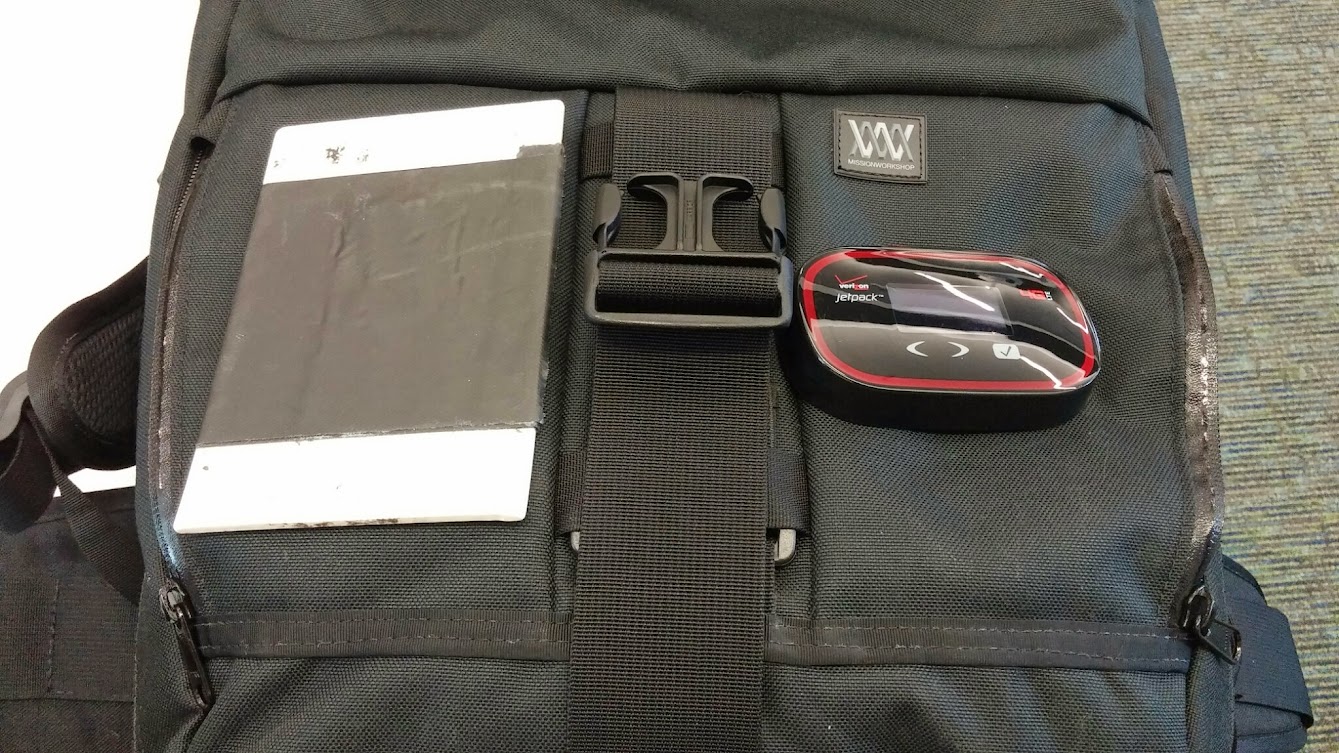
They contain a flat spool of gaffer's tape and my 4G hotspot.
Anyway, if you have any interest in acquiring a new bag, I highly advise checking out Bagbot. It's a fantastic resource, and Christopher is a ridiculously helpful and knowledgeable guy. It's a massive relief to have a functioning bag again, after several frustrating weeks. I'd recommend the Mission Workshop Vandal to anyone with a ton of gear to haul who wants a durable, flexible, relatively compact bag with a huge amount of potentially expandable space.
If you don't have any steno gear to haul, check out this dude using it for his groceries. (Soundtrack is instrumental music only; captions not required.)
Just as my Lowepro's zippers were gasping their last, I was fortuitously contacted by Christopher of Bagbot. We originally talked about the possibility of me commissioning a custom-designed steno bag from him, but then he pointed me to the Mission Workshop Vandal and said that it seemed to fulfill most if not all of my stated requirements. I bought one and have been using it for a little under a week, taking notes the whole time. I might send it to him for additional customization once I've collected enough real-world usage data, but even out of the box it's a far better solution than anything I've used before. Here's a captioned video of me showing off everything I've been lugging in it for the past several days.
I had to wrap up the video in a bit of a hurry because the university's AV guy suddenly walked into the room I was using, so I forgot to mention the two front pockets:

They contain a flat spool of gaffer's tape and my 4G hotspot.
Anyway, if you have any interest in acquiring a new bag, I highly advise checking out Bagbot. It's a fantastic resource, and Christopher is a ridiculously helpful and knowledgeable guy. It's a massive relief to have a functioning bag again, after several frustrating weeks. I'd recommend the Mission Workshop Vandal to anyone with a ton of gear to haul who wants a durable, flexible, relatively compact bag with a huge amount of potentially expandable space.
If you don't have any steno gear to haul, check out this dude using it for his groceries. (Soundtrack is instrumental music only; captions not required.)
Monday, April 13, 2015
Article on Captioning at SRCCON
Erika Owens has written a fantastic article for Open News on captioning at SRCCON last summer (which is rather less "gee-willikers" in tone than the one posted on Philly.com in August), and it stands alongside Lindsey Kuper's article Your Next Tech Conference Should Have Realtime Captioning as a beautiful explanation by a non-captioner of why captions are so great for a huge swath of conference attendees -- not just those who self-identify as deaf or hard of hearing.
I didn't get to provide captions for SRCCON last year, but the response to Norma and Stan's captions was so overwhelmingly positive that it looks like they'll be captioning it again this year, and I'm really hoping my schedule will allow me to come and help them out! I love seeing the momentum build for tech conference captioning. It seems like whenever it's offered at one conference, it kicks off a chain reaction in audiences and organizers alike. Perhaps in the future it'll just be de rigueur, and anyone who wants to attend or speak at a conference -- whatever their language fluency or hearing status -- will have it freely available to them without any effort on their part. Here's hoping!
I didn't get to provide captions for SRCCON last year, but the response to Norma and Stan's captions was so overwhelmingly positive that it looks like they'll be captioning it again this year, and I'm really hoping my schedule will allow me to come and help them out! I love seeing the momentum build for tech conference captioning. It seems like whenever it's offered at one conference, it kicks off a chain reaction in audiences and organizers alike. Perhaps in the future it'll just be de rigueur, and anyone who wants to attend or speak at a conference -- whatever their language fluency or hearing status -- will have it freely available to them without any effort on their part. Here's hoping!
Monday, March 30, 2015
Gratitude
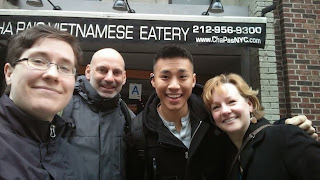
Since I started this job eight years ago, I've been absurdly, ludicrously lucky in so many different ways. Not only have I managed to make a good living doing what I love, not only have I managed to commission and design the software I use for a fraction of what it would normally have cost to develop it, but I've found some seriously incredible people along the way.
I first learned of Norma Miller when I was still in steno school. Her blog, Now Norma Knits, was mostly focused around her knitting projects, but back when I spent most of my free time obsessively searching for steno blogs, a post of hers on the captioning work she used to do for the BBC came up, and I devoured it. She continued blogging intermittently about her work, and about the student she was captioning through medical school at the time, and then I knew I had to contact her. See, when I was a little kid, I was obsessed with all things medical. The Anatomy Coloring Book was my favorite coloring book, and I would spend hours pretending I was in medical school, making up tests and quizzes and homework assignments for myself, and then even more hours filling them in. At the time I figured that if I wanted to study all that weird, gross, glorious stuff for real -- anatomy, physiology, pharmacology, microbiology, and all the rest -- I'd have to become a doctor when I grew up. For various reasons, I eventually realized that actually becoming a doctor was not going to be my calling, but I still had that intense hankering to be a fly on the wall in medical school, and there Norma was, literally living my dream. I sent her some fan mail and we struck up a correspondence that kept going after I graduated steno school and went into business for myself. When I landed a remote captioning contract with a medical school a few years later, I realized I wasn't going to be able to handle it all myself (since I also had a few onsite clients at the time), so I got in touch with Norma and asked if she was up for pitching in. That led to me eventually giving the entirety of the contract over to her a few years later (as my onsite clients demanded more and more of my attention), and a few years after that, we began to talk about setting up the first realtime captioning firm specifically dedicated to serving medical, dental, veterinary, and pharmacy students and professionals. That, of course, became White Coat Captioning, and it's a fairly new enterprise, but already going strong.
Rewind a few years. Remember how I mentioned that my onsite clients were demanding so much of my time? I was the sole captioner for two art schools in the City, with new students who needed captioning coming in all the time, and I wasn't sure what to do. I couldn't cover all of it myself, but I didn't want to give up the contracts to another firm unless I could trust them to hire only solid, reliable, fully qualified providers. Unfortunately there wasn't anyone I knew in NYC who fit the bill. There was Jennifer Bonfilio's excellent company Coast 2 Coast Captioning out in New Jersey, but she had too many of her own clients to be able to do much work in the City. I didn't want to have to start my own company, since I've always been a sole proprietor by nature, but I knew I'd have to find someone to help me out in a hurry or risk putting my clients in a terrible bind. In a sudden and wonderful stroke of luck, I got a phone call out of the blue from a captioner named Cory, originally from the Bronx, who'd recently moved back to the area. He'd been doing television captioning for decades, but was looking to move into Brooklyn and switch to CART, and he wanted to know if I had any advice for him. We met for lunch one day and immediately hit it off. He was humble, honorable, and razor sharp. Most importantly, though, he could write beautiful clean realtime, and he could write it fast. He was also a lifelong reader, which I've found is the single best indicator of whether someone's cut out to do CART or not. I happily offloaded some of my excess work to him, and in a few years, he decided to start up his own NYC-based firm, Access Captions. Because he's been doing this work for most of his life, he knows the difference between a court reporter and a realtime captioner. He knows how to hire people who can interact respectfully and professionally with clients. Best of all, he's able to train people up from newly minted rookies into seasoned pros. Like any true captioner, he's a detail-obsessed perfectionist in the best possible way, and he's now running the firm I wish I could have sent my clients to, back before he first got in touch with me. He came along in the nick of time, and I honestly have no idea what my work life -- or the general state of academic CART in this city -- would look like if he hadn't.
Okay, back to 2010 again. I'd been working on getting The Plover Project off the ground, and (again, as a result of staggeringly good luck), I'd managed to find someone with a PhD from the MIT Media Lab to build the software for me. As Plover took shape, I started blogging about it, and a hotshot polyglot linguistics major from Seattle named Stan Sakai, who had taught himself pen shorthand on a whim, wound up stumbling onto my blog. He downloaded Plover, gave it a try, got instantly hooked, and immediately found himself a student version of Eclipse (since Plover wasn't quite ready for prime time at that point) and a Gemini steno machine. Over the course of the next year, he practiced night and day, and finally got up to 225 words per minute without having ever set foot in a steno school. He graduated with his Bachelors Degree, registered a DBA as Superlative Realtime, started doing CART at the University of Washington, got his CSR, RPR, and CCP certifications, and finally buckled under my insistent pestering to come out here and help Cory manage the huge amount of work that Access Captions had landed by that point. Always the adventurer, Stan packed his bags, found a roommate in Hell's Kitchen, and flew across the country. In the few short years that he's been here, he's worked at the UN, wowed tech firms and coding conferences with his white-hot realtime, and is currently whupping unbelievable amounts of butt while captioning an intensive German class. I couldn't have designed a better poster boy for the Plover Project if I'd tried.
Now Cory, Stan, and I are all here in NYC, covering as much onsite CART as we possibly can, alongside Cory's other contractors. Norma is holding down the fort in Vermont, with her medical-specialist captioners scattered all over the country, and the two of us are slowly but surely building up White Coat Captioning's client roster. We've all known each other -- or at least have known about each other -- for almost a decade now, but last Saturday was the first time we all had a chance to meet up in person. I'm just so unbelievably happy and grateful to have found colleagues like this. Whenever I send them work that I can't cover, I know with absolute certainty that they'll handle it brilliantly. And if at some point I ever get stuck in the doldrums, I know they'd be happy to send some work back my way as well. We trust each other, we like each other, and we're all constantly learning from each other. People talk about freelancing as an inherently lonely business, but I'm a heck of a lot less lonely knowing that these three amazing people have got my back.
Monday, March 16, 2015
Stump the Stenographer at the AMPHL Conference and Win!
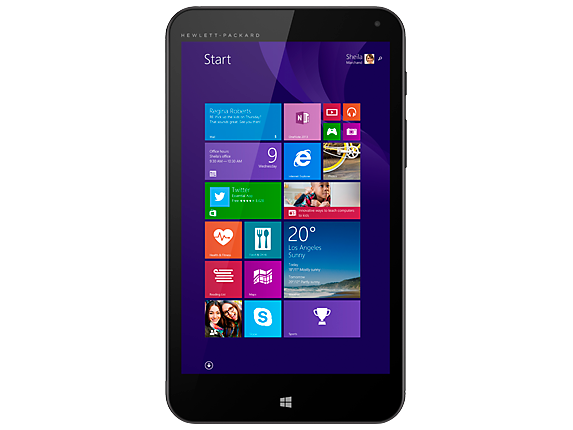
I'm going to be representing White Coat Captioning at the Association for Medical Professionals with Hearing Loss conference in Ann Arbor on May 16th and 17th, and if you're going to be there, you'll have the chance to win an HP Stream 7 tablet running Windows 8.1.
All you have to do is come by the White Coat Captioning table in the exhibit hall and speak, sign, cue, or write a medical word or phrase of your choice. I'll have my captioning equipment set up at the table. If I'm unable to replicate that phrase, correctly spelled, on my computer screen within a few seconds, a card with your email address on it will go in a jar. At the end of the day, I'll pick a card out of the jar at random (assuming anyone's managed to stump me), and that person will win the tablet. It's portable, lightweight and versatile; a perfect handheld device for displaying wireless captions, among many other things. I'll be streaming captions to one at the table, so you can see how cool and compact it is.
To keep things fair, I'm going to give each person three chances to stump me. If I'm able to correctly write all three, tough luck. Your card won't go in the jar. If you stump me three times, you'll get three chances to win! So keep your textbooks handy, because I've got over seven years of experience captioning for Pharmacy, Medical, Dental, and Veterinary schools, plus several more years transcribing interviews for medical journals specializing in Ophthalmology, Hematology, Oncology, Hepatology, and Gastroenterology, among others. (A more complete list of subjects I've captioned or transcribed can be found here.) Hit me with your best shot!
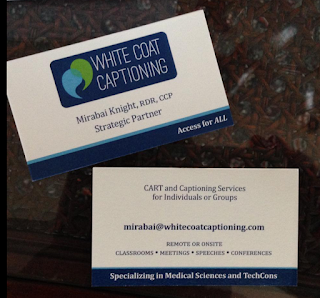
White Coat Captioning is the only CART and captioning firm specializing in medical higher education and technical conferences. For a simulation of what medical captioning looks like when provided by a captioner with medical experience versus one without, check out this video:
The experienced captioner is on the top. The inexperienced one is on the bottom. But I'm pretty sure you already figured that out.
Some firms put captioners without any medical experience on high-stakes jobs, with disastrous results. When you work with White Coat Captioning, you know that will never happen. See you in Ann Arbor!
Friday, February 6, 2015
Strong Demand for Tech Conference Captioning
This blog has been neglected for far too long while I've been focusing my attentions on The Plover Blog, but I've decided to try and get back in the swing of things by posting at least an occasional update here every so often.
To that end, I wanted to mirror a Storify I made several months back after polling my Twitter contacts for feedback on conference captioning. I've been doing quite a bit of conference captioning recently, with several other conference organizers contacting me with at least tentative interest, and I thought it would be worthwhile to get many of the arguments for it in one place:
It's linked in the Storify, but I wanted to specifically point out the excellent article Your Next Conference Should Have Realtime Captioning, by Lindsey Kuper, organizer of !!Con, which I captioned back in March 2014. Many thanks to Lindsey for making it happen; it was a wonderful experience.
I also wanted to post my response to an organizer who asked me recently whether captioners or ASL interpreters could be interchangeable, because this is a common source of confusion for people who want to make their conferences accessible but aren't sure where to start.
"They have different but sometimes overlapping uses. Basically, if someone requests ASL, you should definitely provide it for them, because it's definitely possible that they're more fluent in ASL than in written English, and having to read through captions and then translate into ASL in their head might be really fatiguing. Many people are equally fluent in both, of course, but if they're requesting interpreters rather than captioners, there's usually a good reason for it. Also, a big advantage of ASL interpretation is that the interpreter can walk with the attendee and interpret conversations with other attendees between talks, which is much trickier to do with captioning.
If you don't get requests for ASL, I'd say it might not be worth providing proactively, because odds are there won't be anyone there who knows it, and then you'll be paying interpreters to interpret for nobody. (An estimated 95% of people with hearing loss don't know ASL, because most people lose their hearing later in life, after they've already learned their first language, and most forms of hearing loss fall into the mild/moderate range, whereas the vast majority of people who know ASL are in the severe/profound range, which is comparatively rarer.)
On the other hand, even if you don't get specific requests for captioning, I'd encourage you to provide it proactively, and not just because I'm a captioner. The fact is, hearing loss is extremely common -- 1 out of 7 people have it to one degree or another -- and conferences, where the presenter is at the front of a big room and usually too far away to lip read, can be among the most difficult for people with an amount of hearing loss that otherwise isn't too limiting. So people who are just fine speaking one-on-one with someone in a quiet room can be totally at sea in a conference situation.
Captioning is also really helpful for people who speak other languages and are more fluent in written English than spoken English, people who have attention deficit issues, and people who want to take notes. If you stream your captioning, you can also give people a chance to keep a live feed going on their phone while out in the lobby or wherever, which gives them more flexibility to keep tabs on talks they're really interested in while still being able to hack or socialize.
TL;DR: If you get a request for ASL, please do honor it, even if it means you then won't have enough funding to provide captioning (though obviously both would be ideal). But if you don't get any explicit ASL or captioning requests, please consider providing captioning anyway. In a room of 100 people, odds are that 15 to 20 people at least will get a substantial benefit from it. Live captions are also useful as a starting point for captioned video, if you're planning to post talks online, which is not only useful from an accessibility standpoint, but greatly improves SEO".
If you'd like to read more on this particular topic, please see the excellent Audio Accessibility Blog for the perspective of a deaf accessibility and user experience designer who frequently attends and presents at conferences.
I'm happy to say that Alterconf Oakland/SF, a conference I recently captioned remotely (after captioning their New York City session onsite) did have both ASL interpreters and captioning provided proactively, and I know for a fact that at least one person in the audience (Ian Smith, aka @metaforgotten, in the Storify above, a programmer and linguist whom I've known on Twitter for ages but sadly have yet to meet in person) made use of both the interpreters and the captions while attending.
I have him to thank for this picture:
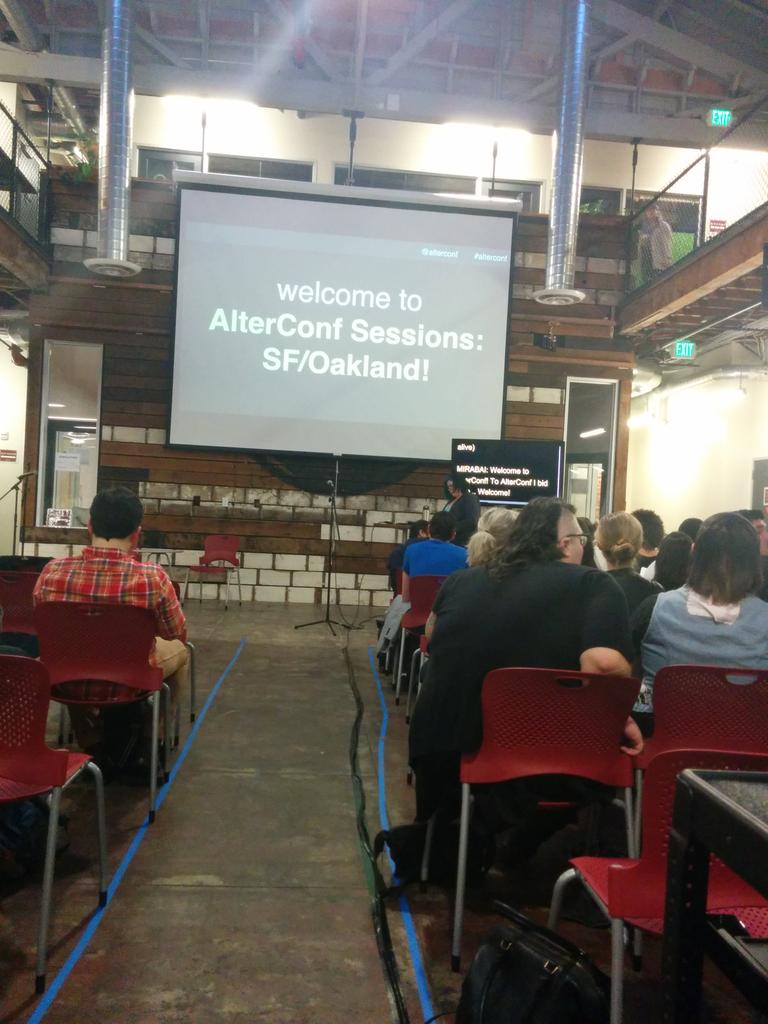
Unfortunately there were some unforeseen technical glitches at the conference venue that prevented me from getting a clean sound feed from the AV board. I had to use audio from the laptop microphone as a last resort, which, as any captioner can tell you, will produce wildly variable results. Some speeches were as clear as daylight, and I got every word. Some were terribly distorted to the point of inaudibility. Fortunately AlterConf Atlanta has pledged to do a full test of their audio equipment before the event, so there should be no further problems on that front. Kudos to AlterConf for their indomitable commitment to accessibility by successfully finding sponsorship for both ASL interpretation and captioning! If only all conferences could follow their example.
Technical difficulties notwithstanding, we got some more great feedback from attendees, so here's just one more brief Storify:
To that end, I wanted to mirror a Storify I made several months back after polling my Twitter contacts for feedback on conference captioning. I've been doing quite a bit of conference captioning recently, with several other conference organizers contacting me with at least tentative interest, and I thought it would be worthwhile to get many of the arguments for it in one place:
It's linked in the Storify, but I wanted to specifically point out the excellent article Your Next Conference Should Have Realtime Captioning, by Lindsey Kuper, organizer of !!Con, which I captioned back in March 2014. Many thanks to Lindsey for making it happen; it was a wonderful experience.
I also wanted to post my response to an organizer who asked me recently whether captioners or ASL interpreters could be interchangeable, because this is a common source of confusion for people who want to make their conferences accessible but aren't sure where to start.
"They have different but sometimes overlapping uses. Basically, if someone requests ASL, you should definitely provide it for them, because it's definitely possible that they're more fluent in ASL than in written English, and having to read through captions and then translate into ASL in their head might be really fatiguing. Many people are equally fluent in both, of course, but if they're requesting interpreters rather than captioners, there's usually a good reason for it. Also, a big advantage of ASL interpretation is that the interpreter can walk with the attendee and interpret conversations with other attendees between talks, which is much trickier to do with captioning.
If you don't get requests for ASL, I'd say it might not be worth providing proactively, because odds are there won't be anyone there who knows it, and then you'll be paying interpreters to interpret for nobody. (An estimated 95% of people with hearing loss don't know ASL, because most people lose their hearing later in life, after they've already learned their first language, and most forms of hearing loss fall into the mild/moderate range, whereas the vast majority of people who know ASL are in the severe/profound range, which is comparatively rarer.)
On the other hand, even if you don't get specific requests for captioning, I'd encourage you to provide it proactively, and not just because I'm a captioner. The fact is, hearing loss is extremely common -- 1 out of 7 people have it to one degree or another -- and conferences, where the presenter is at the front of a big room and usually too far away to lip read, can be among the most difficult for people with an amount of hearing loss that otherwise isn't too limiting. So people who are just fine speaking one-on-one with someone in a quiet room can be totally at sea in a conference situation.
Captioning is also really helpful for people who speak other languages and are more fluent in written English than spoken English, people who have attention deficit issues, and people who want to take notes. If you stream your captioning, you can also give people a chance to keep a live feed going on their phone while out in the lobby or wherever, which gives them more flexibility to keep tabs on talks they're really interested in while still being able to hack or socialize.
TL;DR: If you get a request for ASL, please do honor it, even if it means you then won't have enough funding to provide captioning (though obviously both would be ideal). But if you don't get any explicit ASL or captioning requests, please consider providing captioning anyway. In a room of 100 people, odds are that 15 to 20 people at least will get a substantial benefit from it. Live captions are also useful as a starting point for captioned video, if you're planning to post talks online, which is not only useful from an accessibility standpoint, but greatly improves SEO".
If you'd like to read more on this particular topic, please see the excellent Audio Accessibility Blog for the perspective of a deaf accessibility and user experience designer who frequently attends and presents at conferences.
I'm happy to say that Alterconf Oakland/SF, a conference I recently captioned remotely (after captioning their New York City session onsite) did have both ASL interpreters and captioning provided proactively, and I know for a fact that at least one person in the audience (Ian Smith, aka @metaforgotten, in the Storify above, a programmer and linguist whom I've known on Twitter for ages but sadly have yet to meet in person) made use of both the interpreters and the captions while attending.
I have him to thank for this picture:

Unfortunately there were some unforeseen technical glitches at the conference venue that prevented me from getting a clean sound feed from the AV board. I had to use audio from the laptop microphone as a last resort, which, as any captioner can tell you, will produce wildly variable results. Some speeches were as clear as daylight, and I got every word. Some were terribly distorted to the point of inaudibility. Fortunately AlterConf Atlanta has pledged to do a full test of their audio equipment before the event, so there should be no further problems on that front. Kudos to AlterConf for their indomitable commitment to accessibility by successfully finding sponsorship for both ASL interpretation and captioning! If only all conferences could follow their example.
Technical difficulties notwithstanding, we got some more great feedback from attendees, so here's just one more brief Storify:
Subscribe to:
Comments (Atom)
